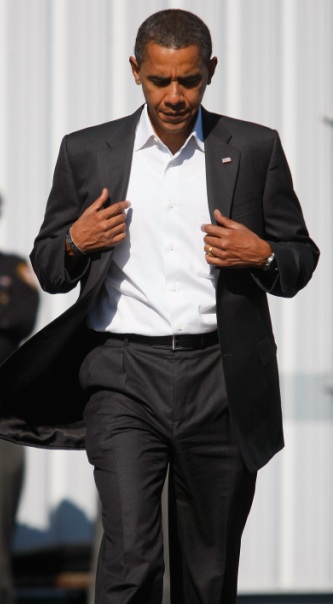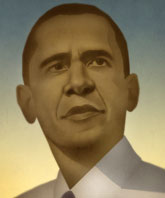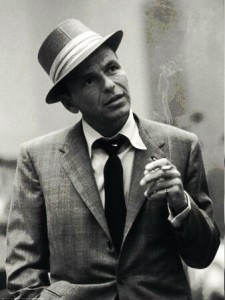The President-elect and The Chairman
Obama fuses JFK with RFK -- the cool concealing the intense emotional message. It’s hard to think of a comparable figure on the American landscape. Well, there’s one. Sinatra.
Jul 31, 20202.3K Shares199.8K Views
Sen. Barack Obama (Getty Images)
He burst into public attention as Abraham Lincoln did, with a speech. When he next commanded the nation’s attention, last winter in Iowa and New Hampshire, what was remarkable was not only the power of his speaking but the intensity of his audience’s response — and his young audience most of all.
So Barack Obama came to be compared not just to political leaders who were powerful speakers — Lincoln, Winston Churchill and Martin Luther King Jr. -– but also, inevitably, to rock stars. Who else could draw so many rapt young people to a hastily scheduled event? Who else could send them cheering into the night?
Illustration by: Matt Mahurin
But the rock-star parallel always struck me as fundamentally off. Rock stars, since Elvis and Mick Jagger, have usually been demonstrative types. Their full-body excess is part of their appeal.
Not so Obama. He is cool where they are hot. He is precise and elegant and reserved. He knows he packs an emotional wallop, because he always understood that the success of his candidacy signaled, in itself, an astonishing historic transformation of the United States.
It was the latest in the chain of defining national events that began with the Declaration of Independence, was renewed at Gettysburg, given irresistible moral urgency at Montgomery, Birmingham, Selma and the Lincoln Memorial; and codified by Lyndon B. Johnson.
He knew his audiences understood this: You could not be an American and fail to understand it — whether you supported his campaign or opposed it.
Strategically, however, for Obama to have made this explicit, to have elevated it to the focus of his campaign, would have been a mistake. It wasn’t the focus in any event. It was its mythic foundation, but to speak of it directly would be to contravene his strategy.
We are not red and blue America, he would say, we are the United States of America, and the audience would shout its assent, understanding that he also had meant, we are not black and white America, we are United. Obama spoke in racial code, not to evoke bigoted rage, but a vision of multiracial harmony and national greatness.
Image has not been found. URL: /wp-content/uploads/2008/11/jfk1-208x300.jpgamericaslibrary.gov
As the campaign evolved and the economy collapsed, Obama’s cool contrasted favorably with Sen. John McCain’s lurching impulsiveness. Obama went into the debates with the clear goal of alarming nobody, and, save for those whose alarm was unalterable, he succeeded. Cool ruled.
Stylistically, direct moral appeal was not something Obama felt comfortable with, either. He spoke of “the fierce urgency of now,” not the fierce urgency of justice or equal rights.
The president-elect preserved a certain loose formality, a protective distance from the crowd even as he delivered lines he knew would make them erupt. Many have compared his manner to that of John F. Kennedy — elegant, slim, detached, ironic.
But Kennedy never touched the depths of emotion that Obama excites. For emotional intensity, particularly after JFK was assassinated, the preeminent Kennedy was Bobby, who before the end of his life came to personify the causes of farm workers and Southern blacks and those excluded all across America.
Obama, in that sense, fuses Jack with Bobby — the cool concealing the immense emotional message that he and we know he conveys. It’s hard to think of a comparable figure on the American landscape — of someone so simultaneously hot and cool.
Well, there’s one. A contemporary, and buddy, of Jack’s, who brought a cool, tough exterior, a sense of precision and understatement, to some deeply emotional content. Not a rock star — though he was the daddy of all rock stars.
Sinatra.
Flickr: Tom Lawrence
No, I’m not saying that Obama is mobbed up or that he drinks with the heavyweights or screws every broad around. Not that Sinatra.
I mean the Sinatra who modulates his way around “One for My Baby” or “Last Night When We Were Young,” who keeps it under wraps until the last eight bars and then lets it go. I mean the Sinatra of “I’ve Got You Under My Skin,” who bites off the words joyously, then stands back and lets the band just wail, as Obama, after he delivers the goods, stands back and lets his audience erupt.
I mean the skinny-tie guy, once even skinnier than Obama himself, who was never disheveled, who celebrated the lyrics, who toyed with his crowds, who understood that, in the songs of Porter and Gershwin and Rodgers and Hart, he had works of substance and emotional wallop that he downplayed until, at the climactic moment, he let them explode.
The cool around the hot. The slow-building case and the moral crescendo. The Chairman of the Board and the President-elect. Barack Obama — in the footsteps of Lincoln, King and Sinatra.
Harold Meyerson is editor-at-large of The American Prospect and an op-ed columnist for The Washington Post.

Hajra Shannon
Reviewer
Latest Articles
Popular Articles


